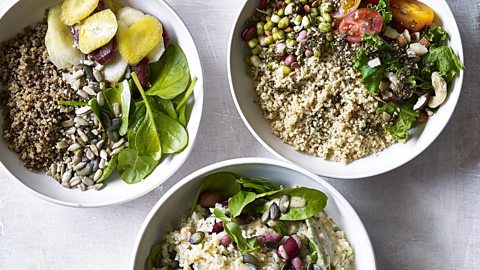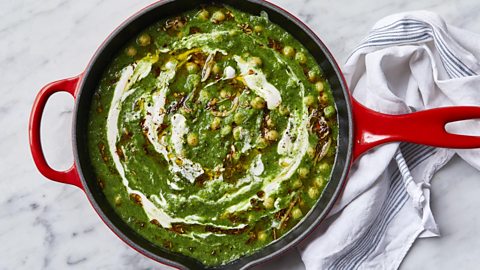How to lower cholesterol through diet
High cholesterol is a common health concern, but how can changing your diet help to bring it down?
By Tai Ibitoye

Results from an revealed 59% of people living in England have high cholesterol levels, with many unaware that they have it.
High cholesterol typically presents no symptoms, but does increase the risk of if left unmanaged.
What is cholesterol?
Cholesterol is produced in the liver, it can also be found in some of the foods we eat.
We all need some cholesterol in our bodies to maintain healthy cells and to contribute to the making of certain hormones and vitamin D which is vital for bone, teeth and muscle health. In addition to this, cholesterol is used to make bile, a digestive fluid, which helps to absorb dietary fat.
Cholesterol travels through the blood on proteins called . The are high-density lipoprotein (HDL) cholesterol, often known as the ÔÇÿgoodÔÇÖ cholesterol and non-high-density lipoprotein (non-HDL), often known as the ÔÇÿbadÔÇÖ cholesterol, which includes LDL.
Too much non-HDL can lead to a of fatty deposits inside the walls of blood vessels, which carry blood throughout the body, causing them to become narrowed or blocked. This can increase the risk of health problems such as heart disease and stroke.
What causes high cholesterol?
Some risk factors cannot be controlled such as , , and family history. However, diet and lifestyle changes can lower cholesterol.
Related stories
Could a mix of veg and fibre-rich dishes like this spiced roasted cauliflower with lentils and tahini yoghurt recipe help lower your cholesterol levels?
How to lower cholesterol
Making small changes to your diet can make a significant difference to cholesterol levels and overall heart health.
Choose fat sources wisely
A common misconception is that by eliminating all fats from your diet youÔÇÖll lower your cholesterol level. However, we all need fats and a small amount can form part of a healthy balanced diet. It can help provide us with ).
It is however, important to be mindful of the type of fat included in our diet. Too much saturated fat is associated with raised ÔÇÿbadÔÇÖ cholesterol in the blood. Research suggests this is because excess saturated fat from working properly, which can affect how much cholesterol is taken out of the blood and into the liver to be broken down.
NigellaÔÇÖs breakfast bars contain lots of healthy fats
Saturated fat is frequently found in animal products such as butter, ghee, lard, meat and dairy products such as full-fat cheese, milk and yoghurt.
Cakes, biscuits and pastries (which use these ingredients) can also be high in saturated fat. This is not to say these are bad foods and should be completely avoided, but moderation is key and we should try to eat less of these in our diet to help lower cholesterol.
The UK government recommends men and women should consume no more than , respectively and reading food labels when shopping can help determine if .
ThereÔÇÖs good evidence that swapping saturated fats with some unsaturated fats can help to .
Unsaturated fats include avocado, olive oil, rapeseed oil, oily fish (like mackerel, salmon and sardines), soya beans or soy products, unsalted nuts (such as almonds, Brazil nuts, walnuts and peanuts) and seeds (such as flaxseeds and sunflower seeds).
Opt for foods high in fibre
There are two main types of fibre in our diet: which are both important for cholesterol management. Soluble fibre dissolves in water to form a gel-like substance, and is found in fruits, vegetables, oats, barley and pulses like chickpeas.
Green pea chickpeas with spiced oilÔÇ»
This high-fibre dish contains 16.1g fibre per serving

Insoluble fibre is left intact as it moves through the digestive system. ItÔÇÖs found in nuts, seeds, wheat bran and fruits and vegetables with skins and pips.
Oats and barley contain a special type of soluble fibre called beta glucan, which has been shown to lower cholesterol levels by forming a gel in the gut which can bind with cholesterol-rich bile acids that stops them being absorbed in the body. ItÔÇÖs suggested that adding can help to lower cholesterol levels. You can get this by eating three servings of beta-glucan rich foods including:
A bowl of porridge (using 30g porridge oats) or one serving of oat-based breakfast cereal flakes (30-35g)
One oat biscuit
75g cooked pearl barley that can be added to stews, soups, salads or risottos
Although soluble fibre is considered to have a greater impact in lowering cholesterol compared to insoluble fibre, itÔÇÖs best to have a variety of fibre-containing foods as most of us are not meeting the recommended intake of 30g a day.
Add plant stanols or sterol products
Including foods with added plant stanols and sterols in your diet ÔÇô such as has been shown to help .
Radio 4's Sliced Bread podcast
Can fortified drinks and spreads really reduce cholesterol? The Sliced Bread team investigate

Studies have shown that eating foods enriched with combined with a healthy, balanced diet can reduce LDL cholesterol levels by 7-10%. The : ÔÇÿYou can achieve 2g per day of plant stanol and sterol by consuming one plant stanol or sterol fortified mini yoghurt drink (one bottle) or yoghurt (one pot) per day which contains all the 2g recommended or, two to three portions of foods with at least 0.8g of added plant sterol/stanol per day such as: Two teaspoons (10g) fortified spread, one fortified yoghurt, one glass (250ml) fortified milk.ÔÇÖ
However, the spreads should not be used for frying or saut├®ing as doing so can reduce the sterol/stanol content. These products are not a substitute for a healthy diet nor a replacement for cholesterol-lowering medication. And if you donÔÇÖt have high cholesterol, these products are not recommended.
Can food containing cholesterol increase cholesterol levels?
Some foods naturally contain cholesterol such as eggs, some shellfish (like prawns and crab) and offal such as liver, but itÔÇÖs not the cholesterol in them that .
Most people can enjoy these foods as part of a healthy, balanced diet. But how these ingredients are cooked matters ÔÇô deep-frying foods with certain oils (such as coconut oil) and eating them alongside foods high in saturated fat (such as bacon and sausages) can increase your saturated fat intake.
One myth thatÔÇÖs been debunked is that eggs will increase your cholesterol. Just choose a cooking method ÔÇô such as poaching them ÔÇô which doesnÔÇÖt add saturated fats
Beyond the diet
Rather than embarking on a restrictive diet, itÔÇÖs far more important to look at your current diet and make subtle, healthier swaps or additions that are appropriate and realistic, rather than completely changing your diet. This can look like having a side salad with every main dish for extra fibre intake, swapping crisps for a small portion of unsalted walnuts, or simply swapping coconut oil with olive oil or rapeseed in cooking.
Also, itÔÇÖs just as important to focus on other aspects of lifestyle to improve cholesterol levels such as being physically active, reducing alcohol intake and stopping smoking. Some people may need to take a medication to lower their cholesterol levels as advised by their doctor but will still need to ensure their overall diet is healthy and balanced to support treatment and lower the risk of heart-related conditions.
Disclaimer: This article is intended for information only and it is not a substitute for proper medical diagnosis or dietary advice given by your doctor or dietitian, respectively.
Originally published October 2024